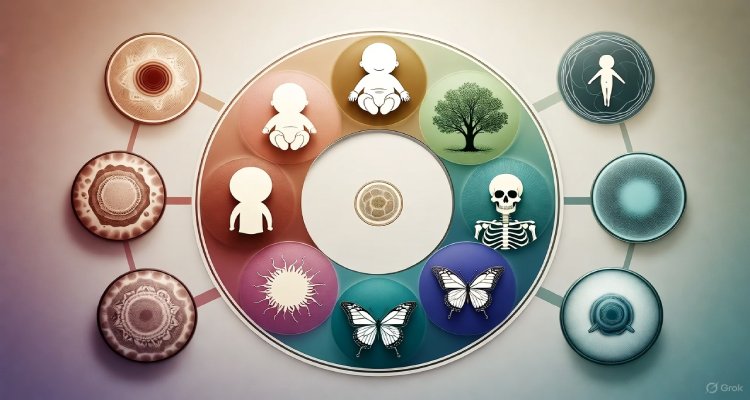The Forgotten Science of Reincarnation

Once dismissed as myth, reincarnation is drawing renewed scientific interest. From past-life memories to quantum consciousness, modern research reexamines life after death.
Introduction: The Question That Refuses to Die
What if death isn’t the end, but merely an intermission?
For centuries, reincarnation— the idea that the soul returns in a new body— has intrigued philosophers, mystics, and now, increasingly, scientists. While modern science once dismissed it as spiritual folklore, a quiet revolution in consciousness research and psychology is reigniting interest in this “forgotten science.”
From university laboratories to psychiatric clinics, a growing number of researchers are probing the possibility that memory and identity may transcend the body. Could there be a scientific basis for rebirth?
Context & Background: A Concept Older Than Civilization
The concept of reincarnation traces back thousands of years— from ancient Hindu scriptures to the teachings of Pythagoras and early Buddhist texts. In Hinduism, the atman (soul) is said to journey through cycles of birth and death, accumulating karma until liberation (moksha) is achieved. Buddhism reinterpreted it as a continuity of consciousness rather than a permanent self.
Western philosophy also flirted with the idea: Plato spoke of souls returning to learn unfinished lessons, and early Christian sects like the Gnostics considered reincarnation before the Church rejected it as heresy.
But with the rise of materialist science in the 17th century, the notion of a soul outside the body was cast aside. For nearly 300 years, reincarnation vanished from mainstream thought— until evidence began resurfacing in the unlikeliest of places: scientific case studies.
Main Developments: From Mysticism to Research
The modern study of reincarnation began quietly in the 1960s at the University of Virginia’s Division of Perceptual Studies (DOPS). Dr. Ian Stevenson, a Canadian-born psychiatrist, documented over 2,500 cases of children who claimed to remember previous lives.
His approach was rigorous: verifying birth records, interviewing witnesses, and matching details children reported— such as names, locations, and causes of death— with real historical data. Many of his subjects, often under the age of six, displayed phobias or behaviors linked to their alleged past identities.
For instance, a child in India who recalled being murdered by a gunshot showed an unexplainable birthmark exactly where the fatal wound would have been. Stevenson’s successor, Dr. Jim Tucker, has since expanded this research, analyzing cases in the United States and Asia with a focus on cognitive patterns and verifiable details.
Meanwhile, hypnosis-based “past-life regression therapy” emerged in psychology— though controversial— as some therapists reported patients uncovering memories that didn’t fit their current lifetime narratives.
Expert Insight: Consciousness Beyond Biology
According to Dr. Tucker, “We may be looking at a phenomenon that challenges our understanding of consciousness itself.” He suggests that consciousness might not be confined to the brain but instead act as a field— a theory that resonates with quantum physicists studying non-locality and entanglement.
Dr. Dean Radin of the Institute of Noetic Sciences argues that “consciousness could be a fundamental property of the universe, not just an emergent product of neurons.” If that’s true, reincarnation could be an expression of consciousness transferring across physical forms.
Skeptics, however, caution against overreach. Neuroscientist Dr. Susan Blackmore maintains that “apparent past-life memories can often be explained through psychological suggestion, coincidence, or cultural conditioning.” Yet, she admits some documented cases remain “deeply puzzling.”
Impact & Implications: A New Frontier of Science and Spirit
If reincarnation were ever scientifically proven, it would upend nearly every field— from psychology and physics to ethics and religion. The implications stretch beyond curiosity: understanding rebirth could redefine moral accountability, trauma therapy, and even how humanity views mortality.
Some hospitals and universities are already studying “consciousness survival” through near-death experiences (NDEs). The parallels are striking— patients report memories, light phenomena, and encounters suggesting awareness beyond the body. Together, NDE and reincarnation research may converge into a broader theory of post-material consciousness.
Even in the cultural sphere, reincarnation is seeing revival through films, literature, and digital forums where people share eerily detailed “past-life memories.” What was once dismissed as myth now fuels a quiet scientific and spiritual renaissance.
Conclusion: Rediscovering the Unseen
The science of reincarnation may still dwell on the fringes, but its questions strike at the heart of what it means to be alive. Whether viewed as spiritual allegory or quantum possibility, the persistence of these stories—and the evidence supporting them—reminds us that consciousness may be far more mysterious than neurons and flesh.
Perhaps the “forgotten science” isn’t about returning to a past belief, but about reclaiming our curiosity about life’s greatest enigma: what happens after death.
Disclaimer: This article is for informational and educational purposes only. It does not claim to offer medical, scientific, or spiritual advice. Readers are encouraged to explore peer-reviewed research and expert literature for further understanding.










